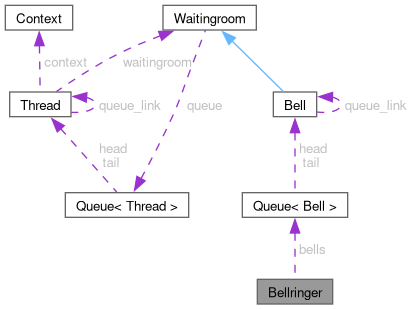
|
StuBS
|
Manages and activates time-triggered activities. More...
#include <bellringer.h>

Public Member Functions | |
| void | check () |
| Checks whether there are bells to be rung. | |
| void | job (Bell *bell, unsigned int ms) |
Passes a bell to the bellringer to be rung after ms milliseconds. | |
| void | cancel (Bell *bell) |
| Cancel ticking & ringing a bell. | |
| unsigned int | residual (Bell *bell) |
Returns the remaining time until bell will ring. | |
| bool | bellPending () |
| Checks whether there are enqueued bells. | |
Private Attributes | |
| Queue< Bell > | bells |
| List of bells currently managed. | |
Manages and activates time-triggered activities.
The Bellringer is regularly activated and checks whether any of the bells should ring. The bells are stored in a Queue<Bell> that is managed by the Bellringer. A clever implementation avoids iterating through the whole list for every iteration by keeping the bells sorted and storing delta times. This approach leads to a complexity of O(1) for the method called by the timer interrupt in case no bells need to be rung.
| bool Bellringer::bellPending | ( | ) |
Checks whether there are enqueued bells.
| void Bellringer::cancel | ( | Bell * | bell | ) |
Cancel ticking & ringing a bell.
| bell | Bell that should not be rung. |
| void Bellringer::check | ( | ) |
Checks whether there are bells to be rung.
Every call to check elapses a tick. Once such a tick reduces a bells remaining time to zero, the bell will be rung.
| void Bellringer::job | ( | Bell * | bell, |
| unsigned int | ms ) |
Passes a bell to the bellringer to be rung after ms milliseconds.
| bell | Bell that should be rung after ms milliseconds |
| ms | number of milliseconds that should be waited before ringing the bell |
| unsigned int Bellringer::residual | ( | Bell * | bell | ) |
Returns the remaining time until bell will ring.
| bell | The bell for which the remaining time should be returned |